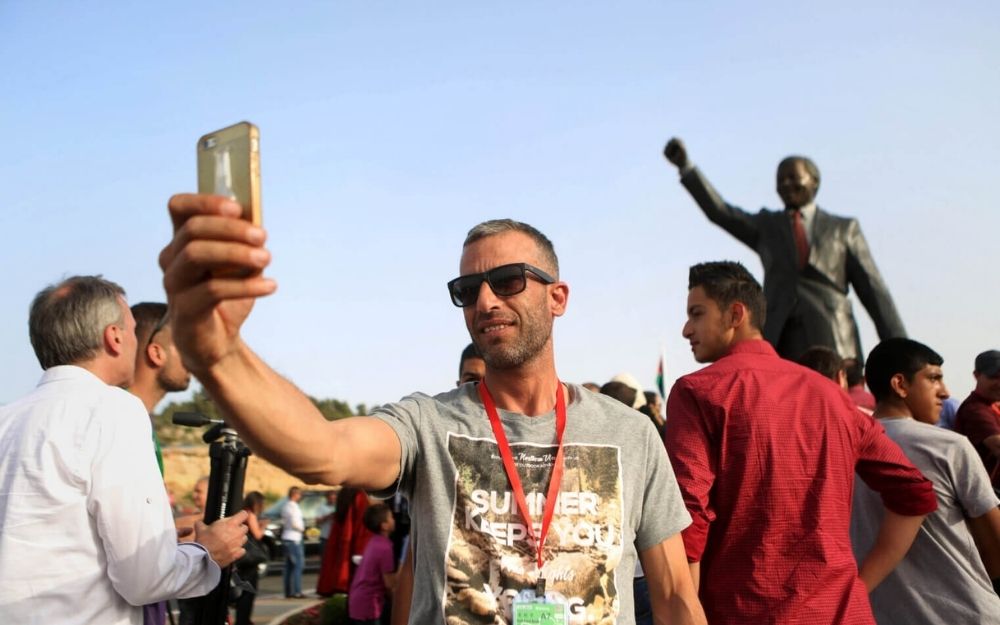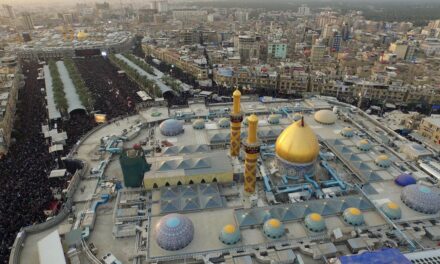Palestinians take part in ceremony to unveil a sculpture of Nelson Mandela, in Ramallah, 2016. The latest polling shows that 65 percent of Palestinians in the West Bank and Gaza see Israeli rule as apartheid. Photo by Shadi Hatem (C) APA images.
The number of experts who characterize Israeli rule over Palestinians as apartheid keeps growing. And several organizations have set up databases to document the trend. “Who’s calling it apartheid?” is Independent Jewish Voices of Canada’s list. Here is a database from the New England Network for Justice for Palestine. Canadians for Justice and Peace in the Middle East has a database too.
As for the latest to say, It’s apartheid– a new survey of Middle East scholars says 60 percent use that word for the Israeli regime in the occupied territories. While 65 percent of Palestinians in the West Bank and Gaza say it’s apartheid, per the latest poll.
The University of Maryland conducted its Middle East Scholars Barometer survey in late March (nearly 600 anonymous responses from a list of 1729 people in professional organizations, nearly 4/5 Americans):
In your opinion, which of the following comes closest to describing the current reality in Israel, the West Bank, and Gaza:
a) The state of Israel with temporary occupation of the West Bank and Gaza 2%
b) The state of Israel with semi-permanent occupation of the West Bank and Gaza 27%
c) Two unequal states 1%
d) A one-state reality with inequality, but not akin to Apartheid 10%
e) A one-state reality akin to Apartheid 60%
Here is the polling of Palestinians saying it’s apartheid, according to the lead Palestinian polling organization:
Two-thirds of the public (65%) approve and 27% disapprove of the assessment that Israel is an apartheid state. Moreover, 48% agree and 40% disagree that Amnesty International’s report on Israel’s racism is an indication of a shift in Western public opinion in favor of Palestinians and against Israel, as it has previously did regarding apartheid in South Africa.
Palestinians are surely reflecting the attitudes in the Democratic party. In 2021, nearly 3/4 of Democrats wanted the U.S. to take neither side, but twice as many wanted it to take the Palestinian side as wanted it to take Israel’s side (17.9 to 9.5%) according to the University of Maryland.
The Middle East Scholars do not largely see Israel proper as an apartheid regime. Only 29 percent say it is such, while 61 percent describe it as a “democratic state with deep structural inequality.” (9 percent see just some inequality.)
And few of the scholars have faith in a two-state solution. A two-state solution “is no longer possible,” say 61 percent, while 36 percent say it’s “possible, but improbable within the next 10 years.”
And when asked what the most likely outcome is in the next 10 years, if a two-state outcome is no longer possible, more than 3/4 of the scholars say, a “one-state reality akin to Apartheid.”
It’s interesting how this reflects Palestinian attitudes. According to the Palestinian Center for Policy and Survey Research poll:
Support for the concept of the two-state solution stands at 40% and opposition stands at 58%.
It’s not like Palestinians support a one-state solution either — 32 in favor, 63 against.
But the Palestinians don’t think a two-solution is possible and a plurality support armed struggle as a response to the occupation.
A majority of 60% believes that the two-state solution is no longer practical or feasible due to the expansion of Israeli settlements while 36% believe that the solution remains practical. Moreover, 68% believe that the chances for the creation of a Palestinian state alongside the state of Israel in the next five years are slim or nonexistent…
When asked about the most effective means of ending the Israeli occupation and building an independent state, the public split into three groups: 44% chose armed struggle, 25% negotiations, and 24% popular resistance. Three months ago, 42% chose armed struggle and 31% chose negotiations.
Again, these attitudes are reflected among Middle East scholars. Asked to assess the prospect of certain outcomes in Israel/Palestine in the next 5 years– 78 percent saw “a new Palestinian Intifada, perhaps including violent confrontations,” as very or somewhat likely. While 72 percent regard “Israeli expulsion of some/many Palestinians” as very or somewhat likely.
There’s also contempt for Biden’s Middle East policies, as compared to Trump’s.
How would you describe Biden’s overall Middle East policy compared to the previous administration?
a) Much better 12%
b) Somewhat better 44c) Not significantly changed 39..
Only 7 percent had a favorable view of Biden’s policy in “advancing Israeli Palestinian peace,” while 68 percent were favorable to his Iran nuclear deal policy. As to the Yemen conflict, again Biden did poorly. 16 percent regard his policy as favorable, 48 percent unfavorable…














